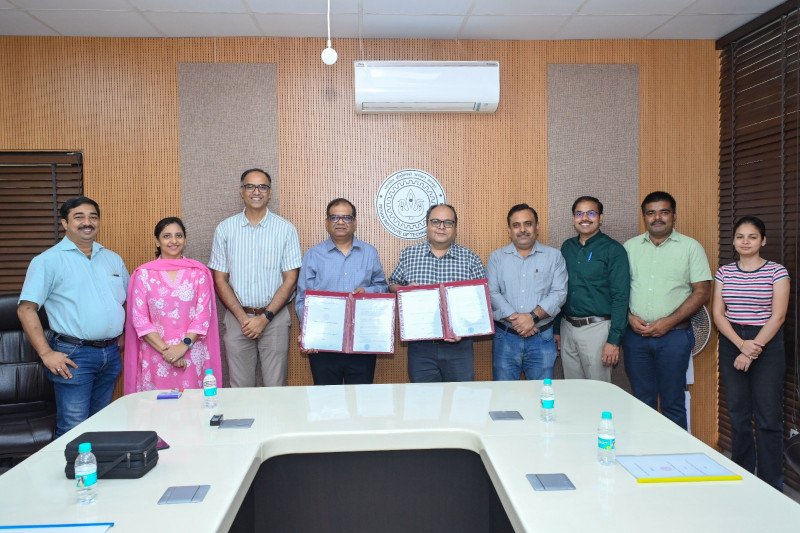To facilitate widespread adoption and commercial success, Indian Institute of Technology Kanpur (IITK) has transferred its unique technology, 'Munh Parikshak,' a portable device for detecting oral cancer, invented by Prof. Jayant Kumar Singh and his team from the Department of Chemical Engineering, to Scangenie Scientific Pvt. Ltd. The device uses special lights and a camera to examine the mouth, providing instant results by analysing mouth images and categorizing them as normal, pre-cancerous, or cancerous. The results are displayed on a smartphone app and stored on cloud servers for continuous updates, making it ideal for self-testing.
The technology licensing agreement was formally signed between IIT Kanpur and Scangenie Scientific Pvt. Ltd. in the presence of Prof. Tarun Gupta, Dean of R&D, IITK; Prof. Ankush Sharma, Professor-in-Charge of SIIC, IITK; Prof. Amitabha Bandyopadhyay, Head of BSBE Dept, IITK; Dr. Prerana Singh, Head of Oral Pathology at MPDC and co-inventor; Prof. Jayant Kumar Singh, ChE Dept. & Inventor, IITK; and Mr. Dhirendra Singh, Licensee & Director of Scangenie Scientific.
Munh-Parikshak is a user-friendly device having white and fluorescence light source that connects wirelessly to smartphones, tablets, iPads, etc. With a built-in power backup, it stores health history for tracking and provides instant oral health reports. The device offers quick and painless screening with 90% accuracy in clinical settings. It is safe, radiation-free, and does not require any additional chemicals or processes.
Prof. Manindra Agrawal, Director of IIT Kanpur, said, "IIT Kanpur is working tirelessly to drive healthcare innovation and tackle critical health issues, and I am delighted to see our innovative technology, 'Munh Parikshak,' being transferred to Scangenie Scientific Pvt. Ltd. I extend my heartfelt congratulations to Prof. Jayant Kumar Singh and his team for their exceptional work. Their dedication has paved the way for this collaboration, which marks a pivotal step in the early detection of oral cancer, significantly enhancing health outcomes and demonstrating the profound impact of our research on society."
Prof. Tarun Gupta, Dean of Research and Development at IIT Kanpur, remarked, "The signing of the MoU with Scangenie Scientific Pvt. Ltd. marks a significant milestone in our mission to transition research and development into commercially viable products. The institute's licensing rate has also seen an increase, which motivates us to further support research across various fields. This MoU aims to effectively market our invention within the healthcare sector, ultimately affordable and beneficial to everyone."
According to market research findings, the oral cancer diagnosis market is expected to reach $2.98 billion by 2032 with a 5% CAGR, while the rapid test kit market, currently at $736 million, is growing at a 7% CAGR until 2027. Oral cancer is among the top global cancers, posing economic and clinical burdens on healthcare systems worldwide, particularly impacting India, where it constitutes up to 40% of cases. Early detection is vital to reduce morbidity and mortality, driving the need for affordable, non-invasive, user-friendly diagnostic tools for widespread screening.
Through this strategic collaboration, IIT Kanpur and Scangenie Scientific Pvt. Ltd. will advance early cancer detection technology, improving healthcare outcomes and showcasing the impact of innovative solutions
About IIT Kanpur:
Indian Institute of Technology Kanpur was established in 1959 and declared to be an Institute of National Importance by the Government of India through an Act of Parliament. IIT Kanpur is best known for the highest standard of its education in science and engineering and seminal R&D contributions over the years. The institute has a sprawling lush green campus spread over 1050 acres with large pool of academic and research resources spanning across 19 departments, 25 centers and 3 interdisciplinary programs in engineering, science, design, humanities, and management disciplines with more than 580 full-time faculty members and approximately 9000 students.


